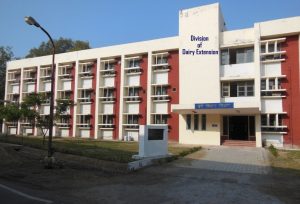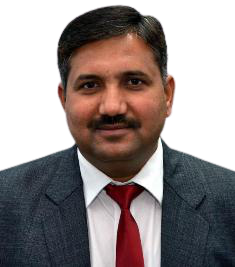Dairy Extension Division
Dairy Extension Division was established at NDRI, Karnal on 15/05/1961 to undertake extension activities, besides teaching and research in Extension Education. Research endeavors of the division are in the areas of Information and Communication Technologies, organizational behaviour, information management, participatory technology development and impact studies of dairy innovations. The faculty has also been engaged in human resource development through graduate, post-graduate and doctoral programmes of the Institute. The major extension programmes are: organisation of All India Animal Husbandry Officer’s Workshop (AIAHOW), functioning of Dairy Vikas Kendra, technology transfer campaigns, infertility and veterinary aid campaigns, formation of SHGs, organisation of Exhibitions, organisation of Dairy Mela, conducting field demonstrations, field days, Kisan gosthies, etc. organisation of Research Extension Industry Farmer Interface, organisation of National and International Training.

These activities strengthen the linkages with end users, helps in understanding the problems of farmers and better dissemination of technologies as well as easy availability of feedback from the farmers. In addition, the Dairy Samachar, a quarterly Hindi patrika of the division provides latest and newer technologies to the farmers at proper time. A new Extension Education Programme "Dairy Education at Farmers' Door" was initiated on 09/02/2009, to strengthen the effective dissemination of dairy production and processing technologies among farming community. A women empowerment lab was established on 21/05/2013 with the objective to create awareness and impart skills in the field of dairy processing and fruit and vegetable preservation and mobilize these groups to take up vocation in these areas division to traind the rural women in value addition of milk and milk product. An innovation educational approach “Farmers Farm School" in village is initiated in 30/08/2014, for educating farmers in the field of dairy farming in particular and agriculture in general. Need based technology development and refinement are continuous processes in which research and extension components work hand in hand. The Institute extension service maintains live and intimate links with the research departments one hand and the field level functionaries of different state departments, development agencies and farmers on the other.The Institute constituted an Extension Council in the year 1989, which is a decision making body for the purpose of assessment and execution of extension programmes. The Council works under the chairmanship of the Director, NDRI and meets twice a year for formal planning and execution of extension activities of the institute.
Objectives:
- To carry out extension research as per clientele needs
- To enable the end-users to adopt the innovations in dairy farming
- To facilitate technology assessment and refinement of dairy innovations evolved by NDRI
- To undertake HRD programmes in dairy extension
- To promote convergence and collaboration for sustainable dairy farming

Dr. Gopal Sankhala
| Sr. No. | Faculty Name | Designation |
|---|---|---|
| 1 | Dr. Ritu Chakravarty | Senior Scientist |
| 2 | Dr. Sanchita Garai | Scientist |
| 3 | Dr. K. S. Kadian | Principal Scientist & Head |
| 4 | Dr. Sanjit Maiti | Senior Scientist |
| 5 | Dr. Hans Ram Meena | Principal Scientist |
| 6 | Dr K. Ponnusamy | Principal Scientist |
| 7 | Dr. Gopal Sankhala | Principal Scientist |
| 7 | Dr Brajendra Singh Meena | Principal Scientist |
- No. of students 10 years
- No.of publications 10 years
- If of publications years
- No. of publication per scientists 10 years
- If per scientists 10 years
- List of research project 10 years
- Research Milestones
- Participatory Technology Development and Dissemination of dairy innovations
- Demand-driven, System-oriented Extension Approaches for enhanced productivity as well as in view of changing climatic conditions
- Low-External-Input- Dairying for Resource-Poor dairy farmers
- Gender perspectives in Technology-Transfer
- Entrepreneurship Development Focused on Dairy Innovations
- Organizational Management and Communication Networks in Dairy sector
- Dairy Innovation System Researches
- ICT-mediated Dairy Extension
Technologies/Extension Models
- Documentation of Indigenous Technical Knowledge (ITKs)
- Empowerment of women dairy farmers
- Human Resource Development
- Participatory Technology Development for sustainable Dairying
- Assessment of Training Needs
- Identification of constraints faced by farmers
- Pilot level testing of technologies
- Development of adoption indices for dairy innovations
Research Work undertaken by the division is duly approved by the Institute IRC. The research projects are formulated and approved under Research Programme, “Promoting Dairy Enterprise through Transfer of Technologies, Improved Farm Financing, Supply Chain Management and Better Market Access.”
| Sr. No. | Name of project | Project team | Duration (Duration in Year) | Funding agency | Budget |
|---|---|---|---|---|---|
| Externally funded project | |||||
| 1 | Capacity Building of Resource Poor Farmers in Paddy-Wheat Dairy Production Systems through Farmer FIRST (Farm, Innovation, Resources, Science and Technology) Programme under Irrigated Agro-Eco. Region of Haryana. | Gopal Sankhala B.S. Meena, H.R. Meena, S.S. Lathwal, Rakesh Kumar, Ajmer Singh, A.K. Singh, V.K. Pandita, Nitin Tyagi, Heena Sharma, Sachin Omvir Singh. | 2016-2020 | ICAR | 125.13 Lakh |
| 2 | Improving Livelihood of Rural Women through Dairy based Secondary Agriculture | K Ponnusamy Latha Sabikhi G.S. Meena | 2017-2020 | DST | 45.02 Lakh |
| 3 | Farmer Participatory Assessment of Cost Effective Solutions for Management of Ticks and Mites in Dairy Animals: An Action Research in Haryana | K Ponnusamy T.K. Mohanty S Raju | 2019-2020 | NIF project | - |
| 4 | Livelihood Vulnerability to Climate-Change among the Changpa Pastoral Nomads of Leh-Ladakh | Sanjit Maiti K.S. Kadian Sanchita Garai Mukesh Bhakat | 2017-2019 | ICSSR, New Delhi | 08.00Lakh |
| 5 | New Extension Methodology and Extension Approaches | B.S.Meena H. R. Meena K.S.Kadian A.K.Dixit Sachin Kumar | 2018-2020 | ICAR, New Delhi | - |
| Institute Project | |||||
| 6 | Automation on Commercial Dairy Farm in North India: Farmers Perspective Appraisa | H.R. Meena K.S. Kadian, B.S. Meena Gunjan Bhandary | 2018-2020 | ICAR-NDRI | - |
| 7 | Career Dynamics of Dairy Graduates in India: An Exploratory Study | Sanjit Maiti S.K. Jha, Sanchita Garai, Ritu Chakravarty, | 2016-2019 | ICAR-NDRI | - |
| 8 | Dairy Farmers’ Willingness to Pay for Need-based Dairy Extension Service in Haryana | Sanchita Garai K.S. Kadian, Sanjit Maiti, B.S. Meena, S.K.Jha | 2017-2020 | ICAR-NDRI | - |
- NDRI- Mobile Advisory Services Portal was developed and used to disseminate for information/advisories to dairy farmers by SMS in local language based on farming practices across six states namely Haryana, Punjab, Gujrat, Uttarakhand, Uttar Pradesh and Rajasthan. Through this portal two messages in a week are send to registered farmers. The study indicated that increase in knowledge of breeding practices (16.73%), feeding practices (17.74%), healthcare practices (14.16%), management practices (21.12%), fodder production practices (17.49%), and overall knowledge of dairy farming practices was 18.50 percent.
- Women empowerment through livestock technologies were conducted in Karnal district and it was observed that Farm women could able to reduce 30 per cent production cost by adopting the feed preparation at their farm levels. The improved fodder variety BL 42 enhanced the income with the range of 10-15% due to more number of cuts and higher yield.
- Technological change in dairy farming in Trans-Gangetic plains and its effect on employment generation was revealed that there was significant technical change in adoption of scientific dairy farming practices and it was increased over the period of time span from 61.37 percent ( in2005-06) to 70.73 percent (in 2015-16). Further, all the productive and reproductive parameters of dairy animals were improved by adoption of scientific dairy farming practices. Moreover, there was substantial increase in rural employment through dairying. In nutshell, in 2005-06 the total number of peoples was 146 who were engaged to different activities for their livelihood and they increased up to 259 over a period of ten. This change reflect proper management of the dairy animals due to the effective mechanism of extension service and technological development by Agricultural research system in the Trans-Gangetic plains.
- Deagrarianization and its effect on livelihood security of farming community in Punjab was conducted and it was observed that the most important Pull factors for deagrarianization were : Higher Education leads to Deagrarianization (92.33%), Easily and adequate access to bank, cooperative loans etc. (91.67%), Assured income from own business (shopkeeper, kiryan store, general store) (91.67%). Whereas the important push factors were : Seasonality of agricultural activities (93.00%), Availability of less family labour (89.00%), Uncertainty of crop production due to attack of pest and diseases. The Landless and marginal farmers were satisfied with their new occupation by quitting crop farming up to 88.33 percent. Further, ‘My current job is enjoyable and easy as compared to agriculture (88.53%)” and new occupation gives more income compared to agriculture (22%) were provided satisfaction to the sampled farmers.
- Back to previous page
- |
-
Page last updated date:21-03-2025 06:34 PM












